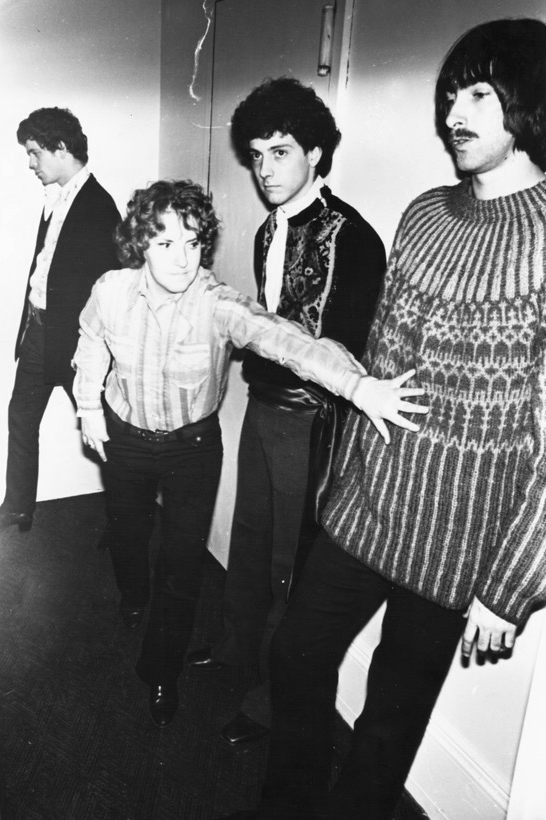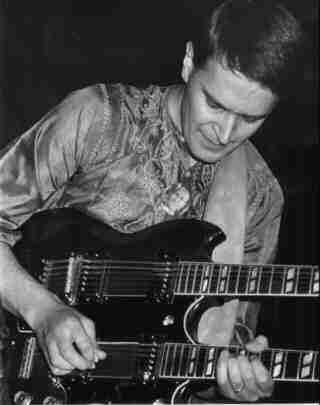|
Time's Up (Living Colour Album)
''Time's Up'' is the second studio album by the band Living Colour, released on August 28, 1990 through Epic Records. It was the follow-up to their successful 1988 album ''Vivid''. ''Time's Up'' features a wide range of genres and also includes cameo appearances by Queen Latifah, Little Richard, Doug E. Fresh, Maceo Parker and James Earl Jones. The album reached gold status, peaking at #13 on the ''Billboard'' 200, and won a Grammy for Best Hard Rock Performance. It is the final album to feature Muzz Skillings on bass, though it was not his last release with the band (as he appeared on the ''Biscuits'' EP). In late February 2014, the album was reissued in Europe by Music On CD and is available once again. Music ''Time's Up'' has been described as a hard rock and funk metal album, with elements of hip hop, jazz, funk, jazz fusion, Delta blues, soul, heavy metal, punk rock, and art rock. Critical reception In ''The Village Voice''s annual Pazz & Jop critics' poll for the ye ... [...More Info...] [...Related Items...] OR: [Wikipedia] [Google] [Baidu] |
Living Colour
Living Colour is an American rock band from New York City, formed in 1984. The band currently consists of guitarist Vernon Reid, lead vocalist Corey Glover, drummer Will Calhoun and bassist Doug Wimbish (who replaced Muzz Skillings in 1992). Stylistically, their music is a creative fusion influenced by heavy metal, funk, jazz, hip hop, punk, and alternative rock. The band's lyrics range from the personal to the political, including social commentary on racism in the United States. Living Colour has released six studio albums so far. The band rose to fame with their debut album ''Vivid'' in 1988. Although they scored a number of hits, Living Colour is best known for their signature anthem "Cult of Personality", which won a Grammy Award for Best Hard Rock Performance in 1990. They were also named Best New Artist at the 1989 MTV Video Music Awards and won their second Grammy Award for their follow-up album '' Time's Up'' (1990). Their third album, ''Stain'' (1993), was also wel ... [...More Info...] [...Related Items...] OR: [Wikipedia] [Google] [Baidu] |
Muzz Skillings
Muzz Skillings (born January 6, 1964, in Queens, New York) is an American bassist, singer, guitarist and songwriter. He is best known for being the original bassist with Living Colour. Skillings played bass, sang backing vocals, and co-wrote songs on the Grammy award-winning 1988 debut album ''Vivid'', the Grammy award-winning 1990 follow up '' Time's Up'', and the 1991 EP ''Biscuits''. His use of melodic, complex and moving bass lines during his time with Living Colour left him with high acclaim from musicians worldwide. Skillings's departure from the band in 1992 was due to musical differences and a desire to branch off and evolve musically outside of Living Colour. He left under good terms (as indicated in his liner notes printed in the album sleeve of Living Colour's 1995 best-of compilation, ''Pride'') and has returned to the band on occasion to substitute for their current bassist Doug Wimbish. Skillings has since led a band called Medicine Stick, in which he plays electr ... [...More Info...] [...Related Items...] OR: [Wikipedia] [Google] [Baidu] |
AllMusic
AllMusic (previously known as All Music Guide and AMG) is an American online music database. It catalogs more than three million album entries and 30 million tracks, as well as information on musicians and bands. Initiated in 1991, the database was first made available on the Internet in 1994. AllMusic is owned by RhythmOne. History AllMusic was launched as ''All Music Guide'' by Michael Erlewine, a "compulsive archivist, noted astrologer, Buddhist scholar and musician". He became interested in using computers for his astrological work in the mid-1970s and founded a software company, Matrix, in 1977. In the early 1990s, as CDs replaced LPs as the dominant format for recorded music, Erlewine purchased what he thought was a CD of early recordings by Little Richard. After buying it he discovered it was a "flaccid latter-day rehash". Frustrated with the labeling, he researched using metadata to create a music guide. In 1990, in Big Rapids, Michigan, he founded ''All Music Guide' ... [...More Info...] [...Related Items...] OR: [Wikipedia] [Google] [Baidu] |
Art Rock
Art rock is a subgenre of rock music that generally reflects a challenging or avant-garde approach to rock, or which makes use of modernist, experimental, or unconventional elements. Art rock aspires to elevate rock from entertainment to an artistic statement, opting for a more experimental and conceptual outlook on music."Art Rock" Encyclopædia Britannica. Retrieved 15 December 2011. Influences may be drawn from genres such as , avant-garde music, |
Heavy Metal Music
Heavy metal (or simply metal) is a genre of rock music that developed in the late 1960s and early 1970s, largely in the United Kingdom and United States. With roots in blues rock, psychedelic rock and acid rock, heavy metal bands developed a thick, monumental sound characterized by distortion (music), distorted guitars, extended guitar solos, emphatic Beat (music), beats and loudness. In 1968, three of the genre's most famous pioneers – Led Zeppelin, Black Sabbath and Deep Purple – were founded. Though they came to attract wide audiences, they were often derided by critics. Several American bands modified heavy metal into more accessible forms during the 1970s: the raw, sleazy sound and shock rock of Alice Cooper and Kiss (band), Kiss; the blues-rooted rock of Aerosmith; and the flashy guitar leads and party rock of Van Halen. During the mid-1970s, Judas Priest helped spur the genre's evolution by discarding much of its blues influence,Walser (1993), p. 6 while Motörhea ... [...More Info...] [...Related Items...] OR: [Wikipedia] [Google] [Baidu] |
Soul Music
Soul music is a popular music genre that originated in the African American community throughout the United States in the late 1950s and early 1960s. It has its roots in African-American gospel music and rhythm and blues. Soul music became popular for dancing and listening, where U.S. record labels such as Motown, Atlantic and Stax were influential during the Civil Rights Movement. Soul also became popular around the world, directly influencing rock music and the music of Africa. It also had a resurgence with artists like Erykah Badu under the genre neo-soul. Catchy rhythms, stressed by handclaps and extemporaneous body moves, are an important feature of soul music. Other characteristics are a call and response between the lead vocalist and the chorus and an especially tense vocal sound. The style also occasionally uses improvisational additions, twirls, and auxiliary sounds. Soul music reflects the African-American identity, and it stresses the importance of an African-Ameri ... [...More Info...] [...Related Items...] OR: [Wikipedia] [Google] [Baidu] |
Delta Blues
Delta blues is one of the earliest-known styles of blues. It originated in the Mississippi Delta, and is regarded as a regional variant of country blues. Guitar and harmonica are its dominant instruments; slide guitar is a hallmark of the style. Vocal styles in Delta blues range from introspective and soulful to passionate and fiery. Origin Although Delta blues certainly existed in some form or another at the turn of the twentieth century, it was first recorded in the late 1920s, when record companies realized the potential African-American market for "race records". The major labels produced the earliest recordings, consisting mostly of one person singing and playing an instrument. Live performances, however, more commonly involved a group of musicians. Current belief is that Freddie Spruell is the first Delta blues artist to have been recorded; his "Milk Cow Blues" was recorded in Chicago in June 1926. Record company talent scouts made some of the early recordings on f ... [...More Info...] [...Related Items...] OR: [Wikipedia] [Google] [Baidu] |
Jazz Fusion
Jazz fusion (also known as fusion and progressive jazz) is a music genre that developed in the late 1960s when musicians combined jazz harmony and jazz improvisation, improvisation with rock music, funk, and rhythm and blues. Electric guitars, amplifiers, and keyboards that were popular in rock and roll started to be used by jazz musicians, particularly those who had grown up listening to rock and roll. Jazz fusion arrangements vary in complexity. Some employ groove-based vamps fixed to a single key or a single chord with a simple, repeated melody. Others use elaborate chord progressions, unconventional time signatures, or melodies with counter-melodies. These arrangements, whether simple or complex, typically include improvised sections that can vary in length, much like in other forms of jazz. As with jazz, jazz fusion can employ brass and woodwind instruments such as trumpet and saxophone, but other instruments often substitute for these. A jazz fusion band is less likely to ... [...More Info...] [...Related Items...] OR: [Wikipedia] [Google] [Baidu] |
Funk
Funk is a music genre that originated in African American communities in the mid-1960s when musicians created a rhythmic, danceable new form of music through a mixture of various music genres that were popular among African Americans in the mid-20th century. It de-emphasizes melody and chord progressions and focuses on a strong rhythmic groove of a bassline played by an electric bassist and a drum part played by a percussionist, often at slower tempos than other popular music. Funk typically consists of a complex percussive groove with rhythm instruments playing interlocking grooves that create a "hypnotic" and "danceable" feel. Funk uses the same richly colored extended chords found in bebop jazz, such as minor chords with added sevenths and elevenths, or dominant seventh chords with altered ninths and thirteenths. Funk originated in the mid-1960s, with James Brown's development of a signature groove that emphasized the downbeat—with a heavy emphasis on the first bea ... [...More Info...] [...Related Items...] OR: [Wikipedia] [Google] [Baidu] |
Jazz
Jazz is a music genre that originated in the African-American communities of New Orleans, Louisiana in the late 19th and early 20th centuries, with its roots in blues and ragtime. Since the 1920s Jazz Age, it has been recognized as a major form of musical expression in traditional and popular music. Jazz is characterized by swing and blue notes, complex chords, call and response vocals, polyrhythms and improvisation. Jazz has roots in European harmony and African rhythmic rituals. As jazz spread around the world, it drew on national, regional, and local musical cultures, which gave rise to different styles. New Orleans jazz began in the early 1910s, combining earlier brass band marches, French quadrilles, biguine, ragtime and blues with collective polyphonic improvisation. But jazz did not begin as a single musical tradition in New Orleans or elsewhere. In the 1930s, arranged dance-oriented swing big bands, Kansas City jazz (a hard-swinging, bluesy, improvisationa ... [...More Info...] [...Related Items...] OR: [Wikipedia] [Google] [Baidu] |
Kerrang!
''Kerrang!'' is a British weekly magazine devoted to rock, punk and heavy metal music, currently published by Wasted Talent (the same company that owns electronic music publication ''Mixmag''). It was first published on 6 June 1981 as a one-off supplement in the ''Sounds'' newspaper. Named after the onomatopoeic word that derives from the sound made when playing a power chord on a distorted electric guitar, ''Kerrang!'' was initially devoted to the new wave of British heavy metal and the rise of hard rock acts. In the early 2000s, it became the best-selling British music weekly. History ''Kerrang!'' was founded in 1981. The editor of the weekly music magazine ''Sounds'', Alan Lewis, suggested that Geoff Barton edit a one-off special edition focusing on the new wave of British heavy metal phenomenon and on the rise of other hard rock acts. [...More Info...] [...Related Items...] OR: [Wikipedia] [Google] [Baidu] |






